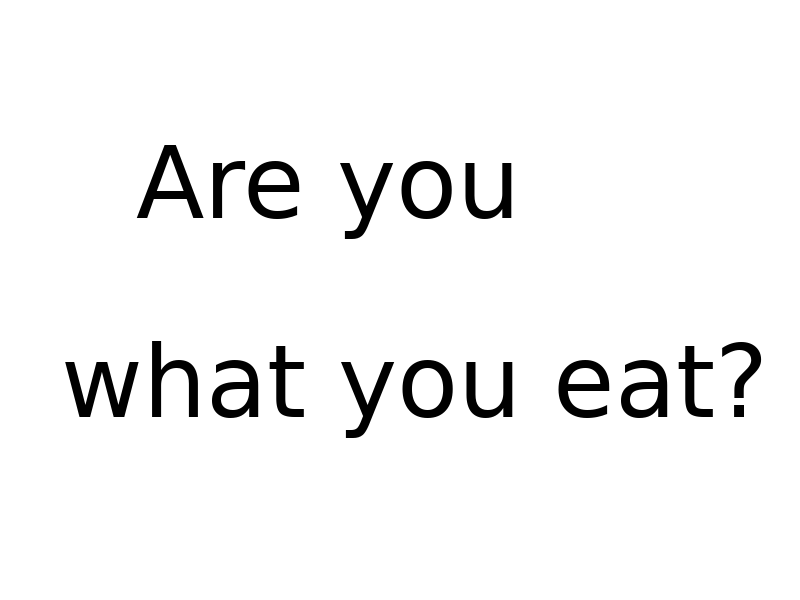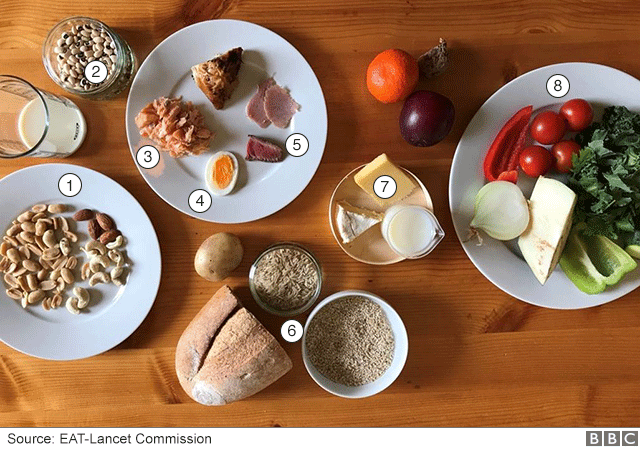"Planetary Health": mixed diet to save the world?
science·@borepstein·
0.000 HBD"Planetary Health": mixed diet to save the world?
 Or at least to seriously decrease human mortality. In which case it would be fair to say that health-wise, at least, you indeed are what you eat. The basic drive here is away from meats and sugars and towards legumes and vegetables and fruits. The diet, however, is not fully vegetarian, never mind vegan. James Gallagher of *BBC* [describes](https://www.bbc.com/news/health-46865204) this diet as follows: > > >Nuts - 50g a day >Beans, chickpeas, lentils and other legumes - 75g a day >Fish - 28g a day >Eggs - 13g a day (so one and a bit a week) >Meat - 14g a day of red meat and 29g a day of chicken >Carbs - whole grains like bread and rice 232g a day and 50g a day of starchy vegetables >Dairy - 250g - the equivalent of one glass of milk >Vegetables -(300g) and fruit (200g) > >The diet has room for 31g of sugar and about 50g worth of oils like olive oil. This is clearly a diet much lower in some items, such as meat and eggs and sugar, for instance, than what many in the Western normally get these days. It is also surprisingly "Mediterranean-like". And Mediterranean has long been lauded for its positive effects on one's health including lower chances of diabetes, lower incidence of inflammatory and autoimmune disease as well as of cardio and pulmonological issues. As someone who spent some time as a vegetarian - and quite, basically due to having low energy without meat in my diet - I must say that this diet has some appeal to me. I have also noticed that when I eat too much meat it either gives me a massive energy boost, or just makes me outright sleepy. I suspect that "Planetary Health" may be exactly the right balance for someone like myself. But personal observations aside, here are a few points I would like to make about this diet. Modern technologies allow to grow plants extremely efficiently and with advances in autmotion, LED lighting and other relevant technologies that efficiency is only likely to increase. As for meat - while we are able to grow it in the lab, it is still predicted that at least for a few more years the price of lab-grown meat is going to be prohibitively expensive. Thus we would be stuck with the current model. And that model basically involves passing massive amounts of food and feed through a farm animal which is then slaughtered for food. I deliberately exclude the discussion of the cruelty of industrial farms from this discussion - all I would like to state here is that meat farming is definitely a rather inefficient process in terms of resource consumption. By lowering - and massively so - resource consumption requirements for animal husbandry the Planetary Health diet promises to improve overall human health. And healthier people tend to experience less stress and thus be more open to deliberation, peaceful resolution of conflicts and overall societal cohesion. And indeed this may be the diet for 10 billion people - a diet that could feed a much larger population using a lot less resources than we use currently. So perhaps we are what we eat - not only individually, but also globally. **_Sources_** [Scientists Have Identified a Specific Diet That Could Save 11.6 Million Lives a Year](https://www.sciencealert.com/scientists-have-identified-a-specific-diet-that-could-save-11-6-million-lives-a-year) Lindsay Dogson, *Business Insider*, 19 January 2019 [A bit of meat, a lot of veg - the flexitarian diet to feed 10bn](https://www.bbc.com/news/health-46865204) James Gallagher, *BBC*, 17 January 2019 [$5 lab-grown burger could be ready by 2021](https://geneticliteracyproject.org/2018/09/28/5-lab-grown-burger-could-be-ready-by-2021/) Daniel Nelson, *Science Trends*, 28 September 2018
👍 nanobot, mys, superultra, imperfect-one, ctime, dknkyz, samotonakatoshi, jesusjacr, bluesniper, allancovelli, igbotier, ohuru, antonmadu, ugbolily, nukwu, ilonavandam, megafart, cifer, accelerator, effofex, asimmehmood, serkagan, vieletporid, switburxiso, oliviad, sophia96, pixresteemer, nataliend, apbartimysq, abigailj3gyplee, taylor5d1cfhall, tisynchhumphfi, olivial9u, pixelfan, solominer, nodaji, curastic, fullvote, ewkaw, apoloo1, britto, up1, steemtank, nazmul1996, cultus-forex, achim86, schlank, thales7, vaughndemont, foruni73, alinakot, deandaniel, mangos, the-oracool, kaylinart, pladozero, smartmarket, devsup, newhope, a1000carv, borepstein, dejan.vuckovic, elowin, jayna, neliacordeiro, marcoteixeira, johnvibes, ninjacyber, jsantana, therising, tailless-cat, kansuze, lereve, ayanamirei, tps, simmanis, idiom, caffelatte, manimoa, crypticat, rocky1, buildawhale, vyaduka, appreciator, upme, upmewhale, babschnae, oceanwhale, oceansbot, minnowwhale, octopusbot, realprofitbot, jellyfishbot, starfishbot, smartdolphin, minnowangel, monsterbot, flashbot, crabbot, penguinbot, sparkey, saveoceans, spacebot, turtlebot, seabirds, speedydolphin, oceanshark, mermaidbot, cutedolphin, spiderbot, snailbot, beanbot, smileybot, bethewhale, skywhale, unicornwhale, dailyhouston, saveoceansbot, upmedolphin, cutewhale, speedywhale, bigobot, sneaky-ninja, alfanso,